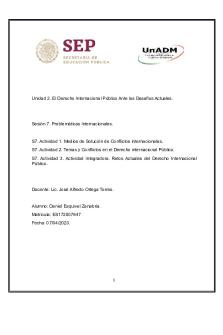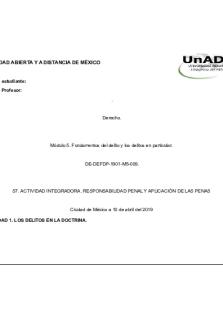8. 5010 U3 Prograssivism PDF

| Title | 8. 5010 U3 Prograssivism |
|---|---|
| Author | Kishor Sukhnani |
| Course | Education in Context: History, Philosophy and Sociology |
| Institution | University of the People |
| Pages | 6 |
| File Size | 103.8 KB |
| File Type | |
| Total Downloads | 71 |
| Total Views | 161 |
Summary
Download 8. 5010 U3 Prograssivism PDF
Description
Introduction The progressivism education theory was applied across American schools which brought about change in teaching and applied thinking. The theory fills a blank canvas with positive ideologies of democracy, learning through experience, and preparing the student to become an active participant within society. The educational aspect of the theory is deeply entrenched in the philosophical beliefs of progressivism. A proponent of equality and unity, the theory itself is rooted in the gospel of scripture and a close analysis emphasizes a strong association.
An in-depth analysis of Progressivism education theory Gaining an understanding of the progressivism theory provides the framework of the educational perspective. The theory is the realization of a clustered term that was originally used in historiography to distinguish chronological phases of how we think, its progress, and whether it is detectable (Tröhler, 2017). Progressivism origins derive from biblical fundamentals. The principles on which the theory is based lends itself to true scripture that advocates learning in natural settings, treating all equally and the highlight is placed on the teachings of the child.
Teachings in natural settings and incorporating the earthly blessings are evident in biblical scriptures. It is apparent in King James Bible (Job 12:7) “But ask the animals, and they will teach you, or the birds in the sky and they will tell you”. It was advocated in the bible that nature itself will provide teachings. Education lies at the center of the child. The child is most susceptible to learning and it must be for this reason, that a solid foundational source is instituted.
John Dewey is known as the founder of the progressivist education theory and believed that learning was a natural proponent (Sikander, 2015). Religious aspects played an integral role in the progressivist’ application. Freedom of thought is expressed as an important aspect of the child. Both John Dewey and Jean Jacque Rousseau provided subjective notions about the individual’s freedom to choose. According to Atasoy, Efe, Jazdzewska and Yaldir (2016), Rousseau encouraged subjectivity and intuitive spontaneity. Similarly, Dewey illustrated an example wherein children participated in games and followed rules willingly to continue.
The same basis applies to class activities wherein students experience the freedom of judgment and thought through the learning experience (Sikander, 2015). These observations are closely drawn with the assumption that man was born freely. As stated in King James Bible (Galatians 5:1) “Stand fast therefore in the liberty wherewith Christ hath made us free and be not entangled again with the yoke of bondage”. The bible declares that mankind was born without bondage which is a representation of the progressivist’s beliefs. Cook and Halpin (2010) explain that religious morality was applied by progressives in faith with the intent to transform society. A society that would be harvested by generations to follow.
The progressive educational theory lies at the heart of molding individuals through a reengineered form of education. Society exists because of its inhabitants. It is for this reason that shaping individuals at the onset will ensure that society is well-managed. As previously mentioned, the child lies at the center of the progressivist theory. The biblical principle links the education of the child to religious virtues. According to King James Bible (Proverbs 22:6) “Train up a child in the way he should go: and when he is old, he will not depart from it”. Bible studies
teach parents to educate their children in the house of God so that their children will not stray from God or his beliefs. As a blank slate, the child is most vulnerable to the teachings of the world. A world wrought with good and evil and encapsulated by opinions and beliefs. Roussouw advocated that when a child learns in nature, s/he is protected from the corrupted world caused by civilization (Atasoy et al., 2016). Better to allow nature to take its cause as opposed to the child being exposed to the ill-doings and teachings of the world.
Allowing for the cultivation of experiential learning and progress through knowledge is a key concept. Dewey argued for an education that would befit the student’s needs and interests (Mintz, 2017). Instead of the child following a pre-determined curriculum, there had to be more options to allow for the student’s natural abilities to be cultivated. All children learn with different capabilities and have varying interests. If the curriculum before progressivism did not address the child’s innate ability then a new approach had to be introduced.
The theory derives from the notion of progressing toward something. In the scenario of the child’s education, the progressivist needed to cultivate a sense of active learning and measuring the learned concepts. As Tröhler (2017) explains, progressivism is concerned with how the individual progresses and demonstratable abilities. Amidon, Monroe and Ortwein (n.d.) provides an illustration explaining that a student memorizing information focus on activating memory and not what is being learned. Comprehension and understanding are important. As the last point, I wish to highlight the similarities to biblical references. The need to have an
understanding and measurable progression was also critical based on scripture. According to King James Bible (Proverbs15:14) “The heart of him that hath understanding seeketh knowledge: but the mouth of fools feedeth on foolishness”. Ensure education aims to measure the exponents of the knowledge gained but most importantly as the progressivist advocates, let there be understanding.
Progressivism education in the classroom The progressivist philosophy explains that the child is at the center of education (Sikander, 2015) which is crucial, especially in the classroom. The mind of the student is very fragile, and it is the educator’s role to provide the right environment for the student. Before education, it is the student that should be considered. Teachers need to be aware that besides the student being fragile, they come from different backgrounds and circumstances. The role the teacher plays is one that provides firstly haven, an inclusion, and an environment that projects love and positivity. In the classroom my approach is universal. I treat all my students with respect and provide a warm and encouraging atmosphere. My students are no lesser than I am. I strongly advocate my desire to empower each one of them.
When Roussouw explains that freedom and subjectivity is an important concept for the student (Atasoy et al., 2016). I concur with his statement as the student requires s certain degree to which s/he experience freedom. The freedom to explore and applying thinking skills critically in an independent manner will foster future thinking skills and solving difficult constructs. The student should be allowed to engage freely and be given a platform to develop these skills. During
classroom interactions, I create a platform for the student to engage, reflect, and participate. There are at times challenges where some students are not as comfortable speaking in front of the class or they tend to talk less during team activities. I apply a counseling session wherein I speak to students separately. I use this time to enquire what barriers are holding them back from expressing themselves. Furthermore, I invest time in getting to know my students and provide room for further elaboration on any challenges they may have. There are instances where some students feel that actively participating by speaking and commenting on every topic is not their forte. I step back at this stage but continue rooting for them and reminding them of the importance of their participation.
The pinnacle of progressivism theory is the role of the child. Sketching an approach that speaks to the child’s needs and the ability to assist in their educational growth. Rooted in the scriptures of the bible, progressivism clearly articulates their purpose by deriving from the book by instilling the basic foundations. Whether wholly or partly conceptualized from the holy scriptures, I fully support the progressivist approach. Not only because the child is at the center but it is the philosophical language of freedom of expression and teaching to understand.
References
Atasoy, E., Efe, R., Jazdzewska, I., & Yaldur, H. (2016). Current advances in education. St. Kliment Ohridski University Press: Sofia.
Amidon, J., Monroe, A., & Ortwein, M. (n.d.). Progressive education. In Education society, & the K-12 learner. Retrieved from: https://courses.lumenlearning.com/teachereducationx92x1/chapter/progressive/education/
Cook, M. & Halpin, J. The role of faith in the progressive movement: Part six of the progressive tradition series. Retrieved from: https://americanprogress.org/issues/democracy/reports/2010/10/08/8490/the-role-of-faith-inthe-progressive-movement/
The bible. King James. 2020
Mintz, A. (2017). What is the purpose of education? Dewey’s challenge to his contemporaries. Retrieved from: https://semanticscholar.org
Sikander, A. (2015). JohnDewey and his philosophy of education. Journal of Education and Educational Development, 2(2).
Tröhler, D. (2017). Progressivism. Oxford Research Encyclopedia, Education. Oxford University Press: USA....
Similar Free PDFs

8. 5010 U3 Prograssivism
- 6 Pages

Proyecto U3
- 33 Pages

Hampton - U3
- 23 Pages

MBA 5010 Unit 5 assignment 1
- 4 Pages

NFNU U3 Contenido
- 46 Pages

Resumen - clase U3
- 4 Pages

MCUM1001(U3) - matematicas
- 36 Pages

U3 Ejercicios - quimica
- 3 Pages

Resumen U3 TGD - ...
- 3 Pages

U3. Peronismo y educación
- 2 Pages

M17 U3 S7 JUFJ
- 18 Pages

M14 U3 S7 DAEZ
- 28 Pages

M5 U3 S7 - M5_U3_S7
- 11 Pages

U3. Texto Kohler
- 18 Pages

U3-Casullo-Populismo
- 2 Pages
Popular Institutions
- Tinajero National High School - Annex
- Politeknik Caltex Riau
- Yokohama City University
- SGT University
- University of Al-Qadisiyah
- Divine Word College of Vigan
- Techniek College Rotterdam
- Universidade de Santiago
- Universiti Teknologi MARA Cawangan Johor Kampus Pasir Gudang
- Poltekkes Kemenkes Yogyakarta
- Baguio City National High School
- Colegio san marcos
- preparatoria uno
- Centro de Bachillerato Tecnológico Industrial y de Servicios No. 107
- Dalian Maritime University
- Quang Trung Secondary School
- Colegio Tecnológico en Informática
- Corporación Regional de Educación Superior
- Grupo CEDVA
- Dar Al Uloom University
- Centro de Estudios Preuniversitarios de la Universidad Nacional de Ingeniería
- 上智大学
- Aakash International School, Nuna Majara
- San Felipe Neri Catholic School
- Kang Chiao International School - New Taipei City
- Misamis Occidental National High School
- Institución Educativa Escuela Normal Juan Ladrilleros
- Kolehiyo ng Pantukan
- Batanes State College
- Instituto Continental
- Sekolah Menengah Kejuruan Kesehatan Kaltara (Tarakan)
- Colegio de La Inmaculada Concepcion - Cebu
